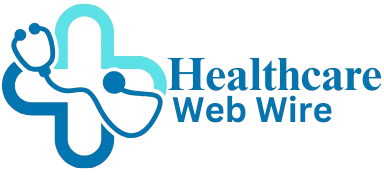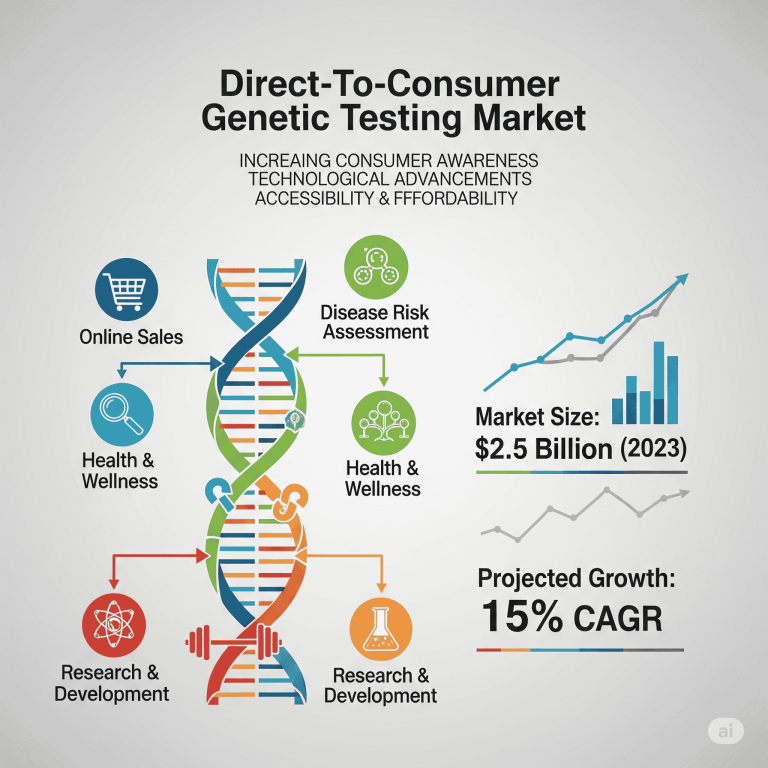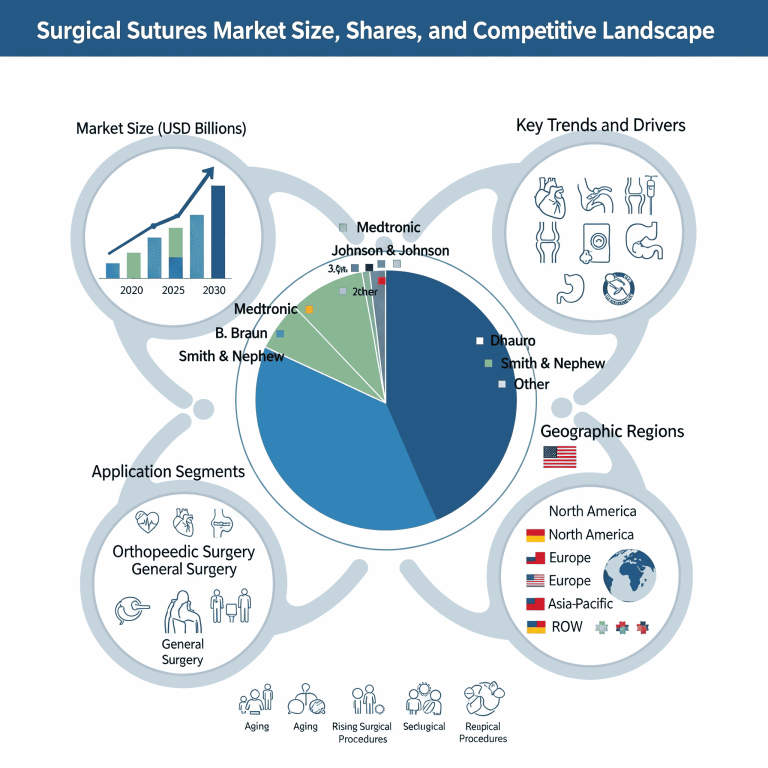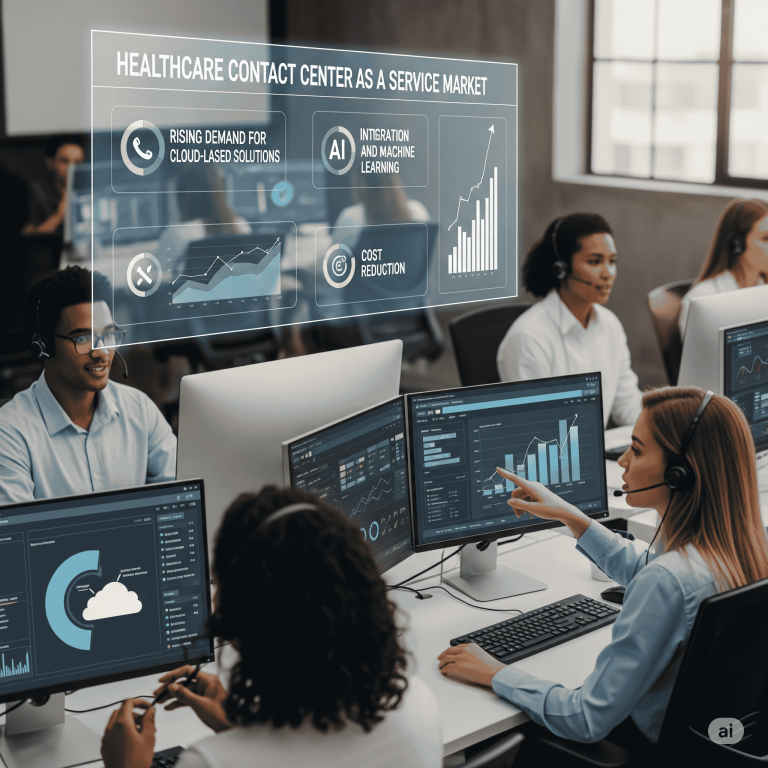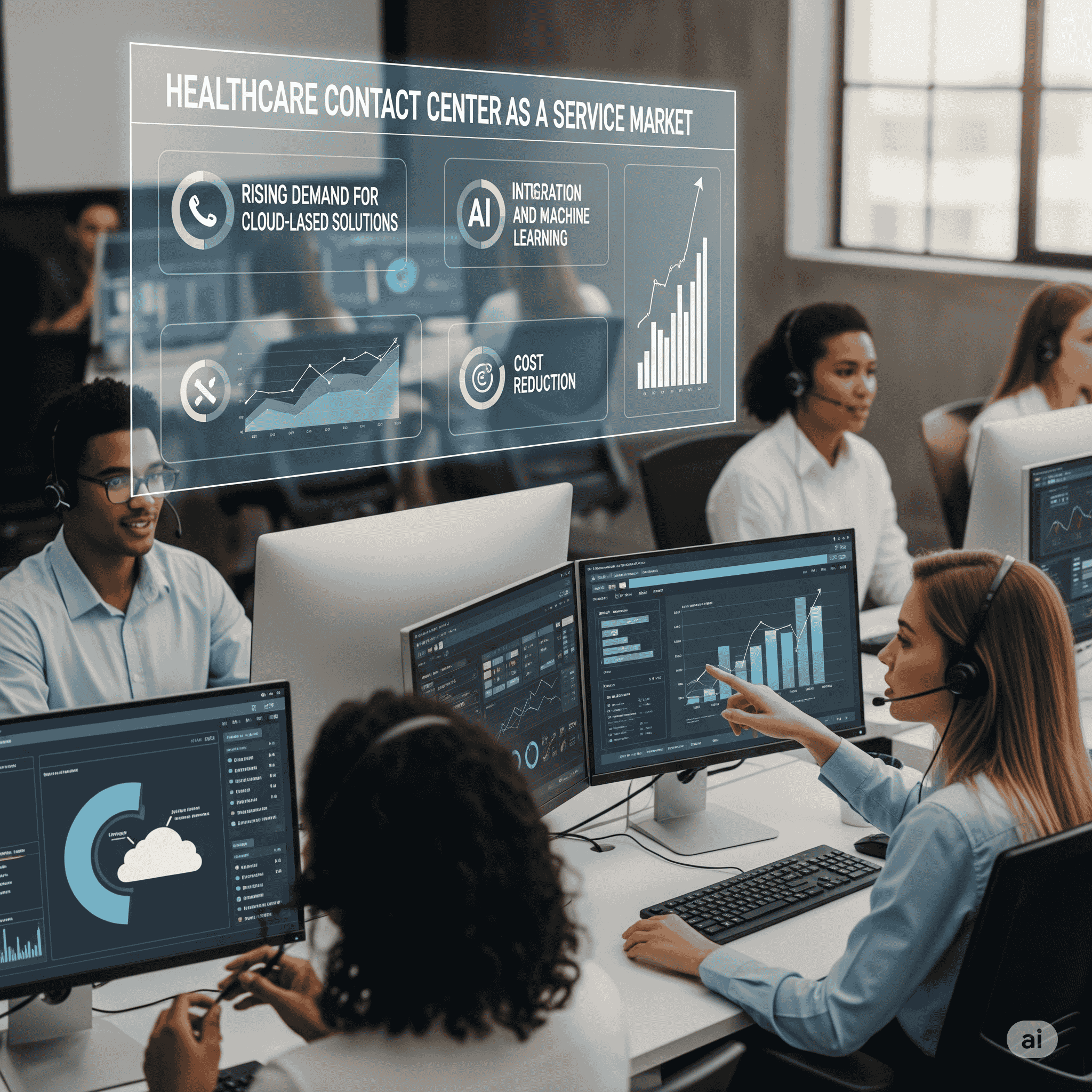
The global healthcare contact center as a service market was valued at USD 5.86 billion in 2024, grew to USD 7.05 billion in 2025, and is projected to reach USD 36.24 billion by 2034, expanding at a CAGR of 20.34% between 2025 and 2034. North America dominated the market with 36% share in 2024, while Asia-Pacific is expected to be the fastest-growing region over the coming years. The market growth is driven by the rising prevalence of chronic disorders, an increasing geriatric population, the growing demand for remote patient monitoring (RPM) and telemedicine, as well as increasing government and private investments in healthcare IT solutions.
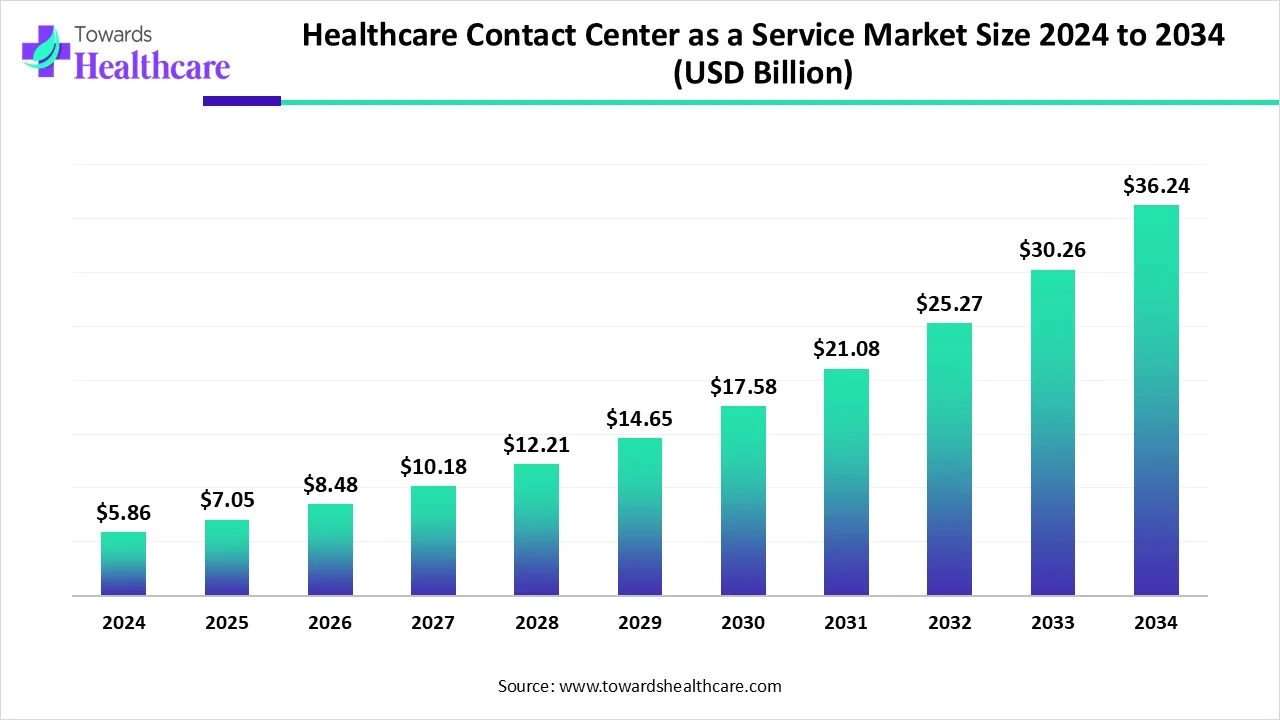
Download the free sample and get the complete insights and forecasts report on this market @ https://www.towardshealthcare.com/download-sample/5658
Healthcare CCaaS solutions provide cloud-based platforms to manage patient interactions across multiple channels such as voice calls, SMS, email, live chat, and social media messaging. They are used for appointment scheduling, prescription refills, insurance inquiries, medical advice, follow-up care, and other patient services. These solutions optimize workflows, reduce wait times, and enhance personalized care for patients.
Market Trends
Microsoft Dynamics 365 Contact Center achieved HIPAA compliance in March 2025, supporting multi-language interactions, real-time data access, and voice recognition adjustments to improve healthcare customer experience.
Cisco partnered with Epic in March 2025 to integrate Webex Contact Center, enabling multi-channel communication for patients and streamlining workflows for contact center agents and care providers.
AI adoption is accelerating, with solutions providing predictive analytics, intelligent routing, and virtual assistants for patient interactions.
46% of call center leaders are planning or implementing LLM-based AI solutions within the next 12 months, enhancing automation, triage, and patient service.
Telemedicine adoption and remote patient monitoring are key trends driving healthcare CCaaS growth, especially in regions with aging populations.
Role of AI in Healthcare CCaaS – In-Depth
AI (Artificial Intelligence) is revolutionizing the healthcare contact center as a service market by improving efficiency, reducing costs, and enhancing patient experiences. Its impact is multifaceted:
1. Automation of Routine Tasks
AI-powered chatbots and virtual assistants handle repetitive tasks such as appointment scheduling, prescription refills, patient onboarding, and billing queries.
This reduces the workload of human agents, allowing them to focus on complex patient interactions.
Relatient’s Dash Voice AI is an example, automating high-volume appointment calls including confirmations and cancellations.
2. Intelligent Routing
AI analyzes patient queries in real-time and routes them to the most appropriate healthcare professional or contact center agent.
Intelligent routing reduces wait times, ensures faster response, and increases patient satisfaction.
This also allows prioritization of urgent medical issues, improving patient outcomes.
3. Predictive Analytics
AI uses historical and real-time data to predict patient needs and behavior.
For example, AI can anticipate follow-up care requirements based on a patient’s medical history or prior interactions.
Predictive insights help healthcare providers optimize staffing, manage call volumes, and improve resource allocation.
4. Natural Language Processing (NLP)
NLP allows AI to understand, interpret, and record patient conversations, identifying emotions, intent, and unmet needs.
Healthcare providers can act on insights from patient sentiment analysis to personalize care.
NLP is also used in transcribing and documenting calls automatically, ensuring compliance with healthcare regulations like HIPAA.
5. Enhanced Telemedicine Support
AI assists telemedicine platforms by guiding patients through symptom assessment, triage, and follow-up care.
Virtual assistants can pre-fill forms, provide instructions before doctor consultations, and reduce administrative delays.
6. Real-Time Data Analysis
AI integrates data from wearable devices, remote patient monitoring (RPM), and electronic health records (EHRs).
Provides real-time alerts for abnormal vital signs or missed appointments.
Helps healthcare providers make data-driven decisions, improving patient outcomes and reducing hospital visits.
7. Personalization of Patient Interactions
AI analyzes previous interactions, patient history, and preferences to tailor conversations and recommendations.
Personalized care improves patient loyalty, engagement, and compliance with treatment plans.
8. AI-Driven Workforce Optimization
AI predicts peak call times and adjusts workforce requirements automatically.
Helps in staff allocation, training needs identification, and performance tracking.
Reduces burnout and ensures consistent quality of service.
9. Large Language Models (LLMs) in CCaaS
According to Hyro.ai, 46% of call center leaders are deploying or planning to deploy LLM-based solutions in the next 12 months.
LLMs provide advanced capabilities such as natural conversation understanding, context retention across multiple interactions, and automation of complex queries.
This integration significantly reduces the dependency on human intervention while maintaining high-quality patient care.
10. Multi-Channel AI Support
AI enables multi-channel support including voice calls, emails, SMS, chat, and social media messaging.
Ensures consistent and efficient service across all communication platforms.
Cisco-Webex and Epic integration demonstrates this, enabling agents to manage multi-channel communication seamlessly.
11. Compliance and Security
AI helps maintain HIPAA compliance by monitoring call and data handling, detecting potential breaches, and ensuring secure storage of patient data.
Microsoft Dynamics 365 CCaaS is HIPAA-compliant, offering secure AI-enhanced workflows and real-time monitoring for patient privacy.
12. Scalability
AI-driven automation allows CCaaS platforms to scale quickly to manage growing patient volumes without proportionally increasing staffing costs.
Zoom’s AI Companion enables scaling to over 15,000 agents efficiently while maintaining healthcare-specific functionalities.
Market Dynamics
Drivers:
Remote Patient Monitoring (RPM): Enables healthcare providers to track patients’ conditions remotely, reducing hospital visits and costs. By mid-2030, 265 million people will be aged 80 and above globally, increasing demand for RPM and healthcare CCaaS solutions.
Restraints:
Staffing Shortages: Healthcare contact centers face high attrition due to burnout, low salaries, or lack of recognition. This leads to longer wait times, lower patient satisfaction, and reduced quality of service.
Opportunities:
Real-Time Data Analytics: Allows healthcare organizations to monitor call volumes, patient satisfaction, and outcomes, while wearable devices feed real-time vital signs to providers.
Integration of Wearable Devices: Supports remote interventions, improving patient care and timely decision-making.
Top Companies in Healthcare CCaaS – In-Depth
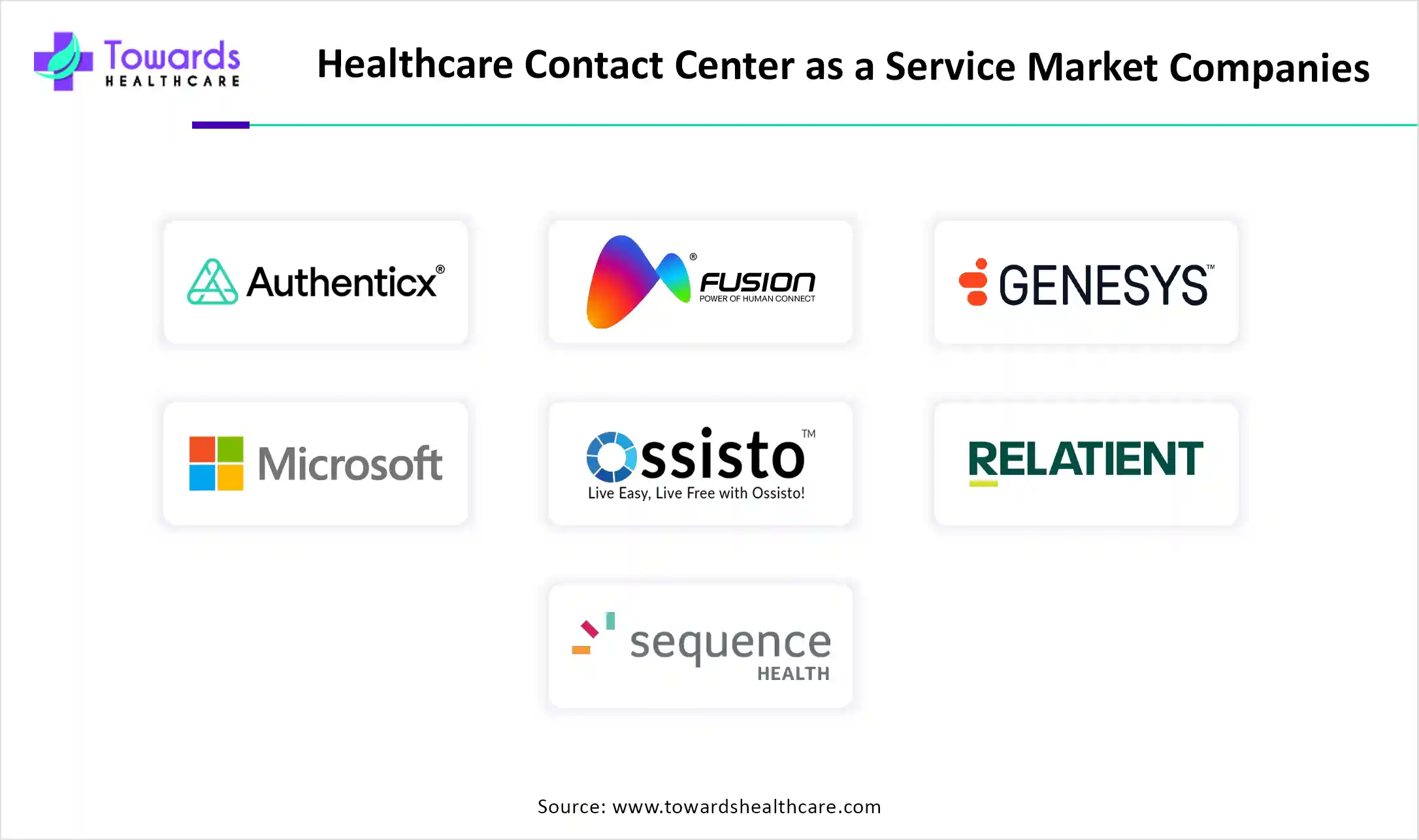
1. Authenticx
Provides AI-driven voice analytics to improve patient experience in healthcare contact centers.
Focuses on capturing patient sentiment during calls to help healthcare providers address unmet needs.
Offers solutions to streamline appointment management, patient feedback, and quality assurance in call centers.
2. Epic
Leading electronic health record (EHR) provider integrating CCaaS solutions.
Partnered with Cisco Webex in March 2025 to expand multi-channel patient communication.
Enables healthcare providers to manage patient calls, chat, and email through a unified platform.
Streamlines workflows, improves patient experience, and enhances telemedicine support.
3. Fusion CX
Provides cloud contact center solutions tailored to healthcare organizations.
Focuses on improving patient engagement and operational efficiency.
Offers integration with EHRs and telemedicine platforms for seamless healthcare communication.
4. Genesys
Global leader in AI-powered experience orchestration and cloud-based CCaaS.
FY2025 sustainability report highlights:
13% reduction in greenhouse gas emissions
EcoVadis Gold rating (top 3% of companies globally)
99.998% uptime for the Genesys Cloud platform
Uses AI for predictive analytics, intelligent routing, workforce optimization, and virtual assistants.
Focus on sustainable innovation, energy efficiency, and scalability.
5. Microsoft
Offers Dynamics 365 Contact Center with HIPAA compliance (March 2025), ensuring security, privacy, and regulatory standards.
AI features include predictive analytics, intelligent routing, NLP-based transcription, and automation of patient interactions.
Azure cloud computing unit supports large-scale CCaaS deployment and growth.
Q4 FY2025 revenue grew 39%, driven by AI adoption and enterprise demand.
6. Ossisto Technologies Pvt. Ltd.
Provides specialized healthcare CCaaS solutions, including appointment scheduling, telemedicine support, and patient engagement services.
Focuses on small and medium healthcare enterprises and startups.
Offers scalable services without requiring heavy IT infrastructure investments.
7. Relatient
Known for its Dash Voice AI, launched in April 2025.
Automates high-volume appointment management, including confirmations, reschedules, and cancellations.
AI-driven solution improves patient communication, reduces manual call center workload, and optimizes resource allocation.
8. SAS Call Center
Uses analytics-driven solutions for patient engagement and contact center management.
Provides insights into call volume, patient satisfaction, and operational efficiency.
Supports both healthcare providers and payers with data-informed decision-making.
9. Sequence Health
Focuses on improving patient-provider communication in healthcare settings.
Offers cloud-based CCaaS with automated workflows for scheduling, follow-ups, and medical queries.
Enhances patient engagement and reduces administrative burden on healthcare staff.
10. Talkdesk
Launched Talkdesk AI Agents for Healthcare in March 2025.
Supports appointment scheduling, authorizations, prescription refills, and telemedicine workflows.
Provides pre-configured industry cloud solutions with AI models tailored to healthcare CCaaS.
Enhances operational efficiency and improves patient satisfaction.
Regional Segments – Healthcare CCaaS Market
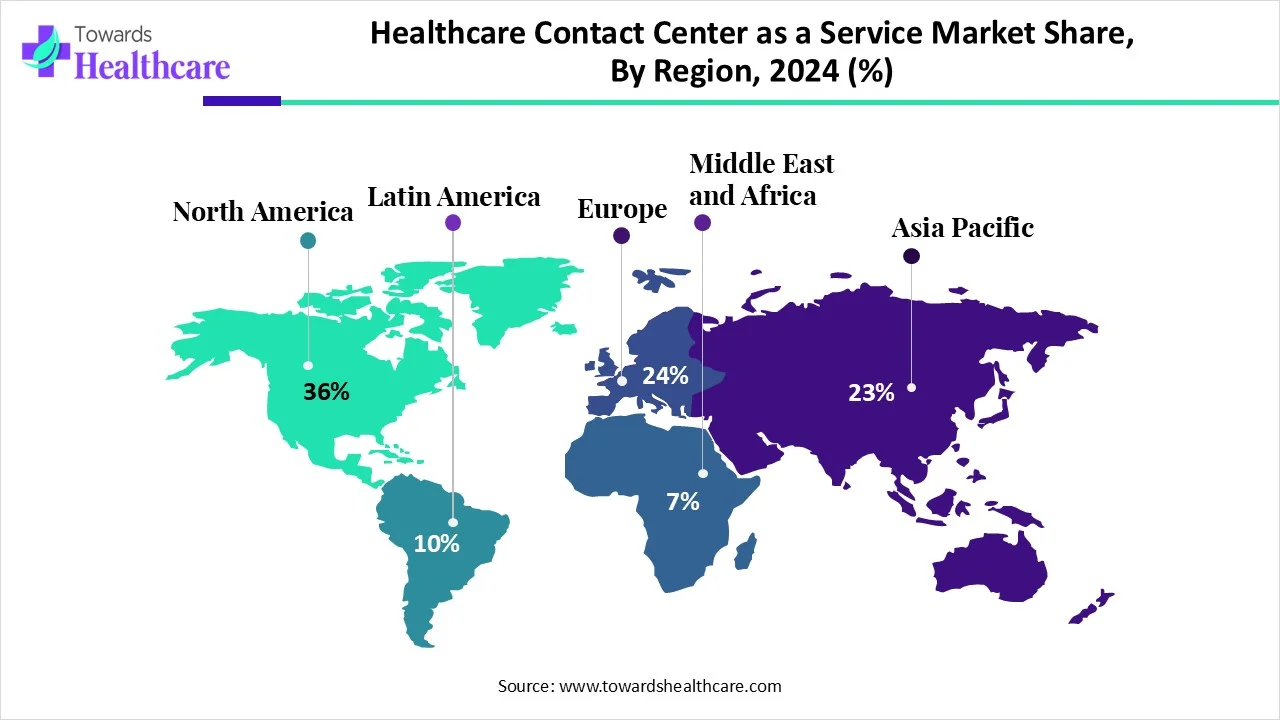
1. North America
Market Share: Dominated with 36% of the global market in 2024.
Drivers:
Well-established healthcare infrastructure with advanced hospitals, clinics, and telemedicine services.
High adoption of Electronic Health Records (EHRs) and digital healthcare solutions.
Growing need for remote patient monitoring (RPM) and personalized patient care.
U.S. Market Insights:
51% of patients satisfied with their healthcare provider’s call center service.
Over 51,000 healthcare companies and 6,093 hospitals (2023).
Over 1 million active physicians, necessitating efficient contact centers to manage patient interactions.
Canada Market Insights:
97,384 physicians in 2023 (243 per 100,000 population).
Only 7% of physicians in rural areas, increasing demand for telehealth CCaaS.
CCaaS helps improve treatment accessibility, especially in rural areas.
2. Asia-Pacific (APAC)
Projected to be the fastest-growing region in the coming years.
Drivers:
Rapidly expanding healthcare sector and rising healthcare expenditure.
Growing geriatric population and rising chronic disorders.
Increasing adoption of telemedicine and remote patient monitoring.
China:
297 million people aged 60+ (21.2% of the population in 2023).
7,881 integrated medical and elderly care institutions (12.8% YoY increase).
Health insurance coverage exceeds 95%, requiring robust CCaaS support.
India:
Healthcare expenditure rose to ₹6.4 lakh crore in 2024-25 from ₹3.2 lakh crore in 2020-21.
National Tele Mental Health Programme (NTMHP) launched to expand mental healthcare services.
Other APAC Countries:
Japan, South Korea, and Thailand are increasingly adopting telehealth solutions and CCaaS for patient engagement.
3. Europe
Market Growth Drivers:
Favorable government initiatives supporting digitalization and cloud adoption in healthcare.
Rising adoption of advanced technologies for patient engagement.
Telehealth strategies in 40 European countries, either as national strategies or part of broader digital health initiatives.
Germany:
Ranked 3rd in the 2024 World Index of Healthcare Innovation (WIHI).
Strong government support for healthcare digitization through initiatives like the Digital Act.
Norway:
Regulatory changes legalized e-consultations for sick leave in 2023.
Digital platforms like eMeistring provide online therapy and mental health support.
Healthcare spending around 8.1% of GDP, one of the highest globally.
4. Middle East & Africa (MEA)
Market Growth Drivers:
Rising digitalization in healthcare services.
Government and private sector investments supporting telehealth and CCaaS solutions.
Enhancing patient accessibility, especially in rural areas.
South Africa:
Urbanization and digitalization are increasing the adoption of CCaaS.
Patients gain easier access and improved availability of healthcare services.
UAE:
Growth in medical tourism drives CCaaS adoption.
Multilingual capabilities promote broader usage in diverse populations.
Saudi Arabia and Kuwait:
Investments in healthcare digitalization and multilingual CCaaS solutions are fostering market growth.
5. Latin America
Market Insights:
Countries like Brazil, Mexico, and Argentina are gradually adopting CCaaS for healthcare.
Demand driven by the need for telehealth solutions and efficient patient communication.
Investment in healthcare IT infrastructure supports the expansion of contact center services.
Recent Developments in Healthcare CCaaS Market
1. Microsoft Dynamics 365 Contact Center
HIPAA Compliance: In March 2025, Microsoft’s Dynamics 365 Contact Center achieved HIPAA compliance for security, privacy, and regulatory standards.
Features:
Supports multiple languages.
Adjustable voice recognition sensitivity.
Access to real-time and historical data.
Impact: Strengthens Microsoft’s position in healthcare CCaaS by ensuring compliance and secure handling of patient interactions.
2. Cisco and Epic Collaboration
Partnership Launch: March 2025, Cisco announced beta integration between Webex Contact Center and Epic.
Purpose:
Expand Epic’s capabilities in patient communication.
Equip contact center agents and care providers with multi-channel communication platforms.
Impact: Streamlines communication workflows and enhances patient experience.
3. Relatient – Dash Voice AI
Launch: April 2025, Relatient introduced Dash Voice AI, an advanced conversational AI feature.
Functionality:
Automates handling of high-volume appointment-related calls.
Manages confirmations, cancellations, and patient notifications.
Impact: Reduces manual workload for agents and improves patient appointment management efficiency.
4. Talkdesk – AI Agents for Healthcare
Launch: March 2025, Talkdesk introduced Talkdesk AI Agents for Healthcare.
Features:
Automates scheduling, authorizations, prescription refills.
Pre-configured integrations, workflows, and AI models tailored for healthcare CCaaS.
Impact: Enhances operational efficiency, reduces errors, and improves patient satisfaction.
5. Zoom – Healthcare CCaaS Expansion
Largest Deal: February 2025, Zoom secured its largest-ever CCaaS deal with a Fortune 100 U.S. tech company, enabling 15,000+ agents in the Zoom contact center.
Future Focus:
Plans to enhance Zoom Workplace for Clinicians with an upgraded AI Companion.
Enables clinical note-taking and specialized medical features.
Impact: Expands Zoom’s CCaaS presence in healthcare and improves telemedicine support.
6. Genesys – Sustainability and Reliability
FY2025 Sustainability Report: Highlights Genesys’ commitment to responsible innovation in AI-powered CCaaS.
Key Achievements:
13% reduction in greenhouse gas emissions compared to FY2024.
Achieved third consecutive EcoVadis Gold rating (top 3% of companies).
99.998% uptime for the Genesys Cloud platform.
New buildings in the Philippines and Hungary received LEED certifications.
Impact: Demonstrates the integration of sustainability with AI and cloud CCaaS solutions.
Segmental Insights
By Component:
Solution Segment: Dominated in 2024 due to comprehensive control over healthcare operations, privacy protection, and applications such as automatic call distribution, call recording, computer telephony integration, reporting & analytics, interactive voice response, and workforce optimization.
Service Segment: Expected to grow fastest, offering integration, deployment, support, maintenance, training, consulting, and managed services, which are cost-effective for small and medium enterprises.
By Enterprise Size:
Large Enterprises: Led the market in 2024 due to infrastructure, capital investment, and the need to manage large patient populations. Cloud integration allows access to patient data anytime, anywhere.
Small and Medium Enterprises (SMEs): Projected for significant growth due to rising healthcare startups and venture capital investments. SMEs benefit from scalable, affordable CCaaS services without heavy infrastructure investment.
By Application:
Healthcare Providers: Held the largest share in 2024, enhancing telemedicine experiences, remote patient monitoring, appointment scheduling, prescription management, medical triage, and follow-up care.
Healthcare Payers: Fastest-growing segment, supporting insurance coverage, claims processing, billing assistance, and maximizing patient benefits from health insurance.
By End-Use:
Healthcare Segment: Dominated the market due to rising chronic disease prevalence, population growth, increased healthcare expenditure, and the need for improved patient care.
Top 5 FAQs
-
What is Healthcare CCaaS?
Healthcare CCaaS is a cloud-based platform managing patient interactions via calls, SMS, email, chat, and social media, improving efficiency, patient engagement, and care quality. -
What is the market size and growth?
The market is USD 5.86B in 2024, USD 7.05B in 2025, projected to reach USD 36.24B by 2034, with CAGR of 20.34%, driven by telemedicine, remote monitoring, and AI adoption. -
How is AI used in healthcare CCaaS?
AI enhances predictive analytics, virtual assistants, NLP-based conversation analysis, intelligent routing, and automation of appointments and prescriptions, improving efficiency and personalization. -
Which regions lead and grow the market?
North America dominated with 36% share in 2024; Asia-Pacific is the fastest-growing due to rising telemedicine adoption, chronic diseases, and healthcare expenditure. -
Who are the key players?
Authenticx, Epic, Fusion CX, Genesys, Microsoft, Ossisto Technologies Pvt. Ltd., Relatient, SAS Call Center, Sequence Health, Talkdesk, Webex Contact Center, Zoom. Key players focus on AI, telemedicine support, automation, and cloud-based services.
Immediate Delivery Available | Buy This Premium Research @ https://www.towardshealthcare.com/price/5658
Access our exclusive, data-rich dashboard dedicated to the healthcare market – built specifically for decision-makers, strategists, and industry leaders. The dashboard features comprehensive statistical data, segment-wise market breakdowns, regional performance shares, detailed company profiles, annual updates, and much more. From market sizing to competitive intelligence, this powerful tool is one-stop solution to your gateway.
Access the Dashboard: https://www.towardshealthcare.com/access-dashboard
Become a valued research partner with us – https://www.towardshealthcare.com/schedule-meeting
You can place an order or ask any questions, please feel free to contact us at sales@towardshealthcare.com
Europe Region – +44 778 256 0738
North America Region – +1 8044 4193 44
Web: https://www.towardshealthcare.com
Find us on social platforms: LinkedIn | Twitter | Instagram | Medium | Pinterest
